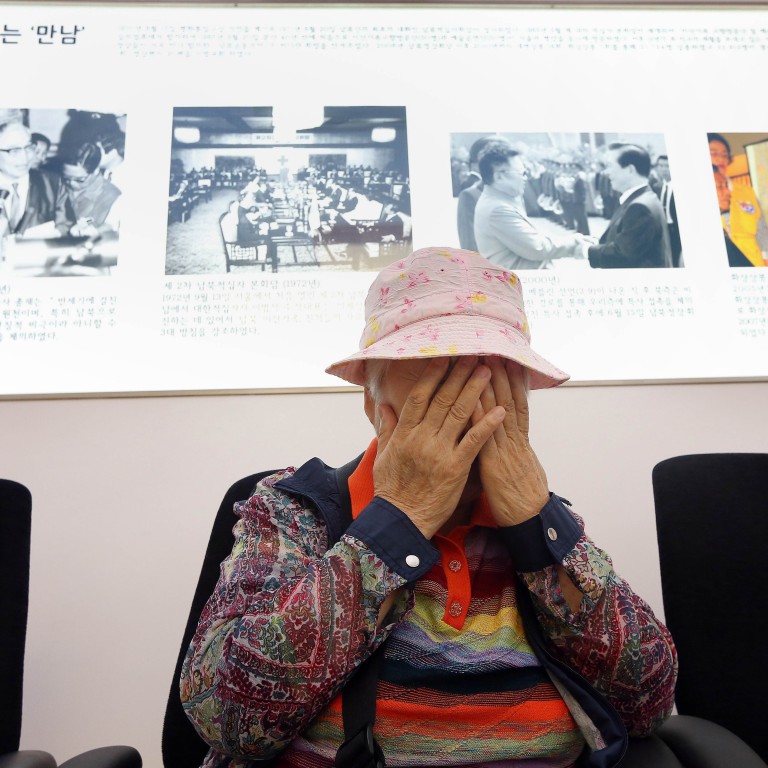
Elderly Koreans distraught as family reunion hopes crushed
Cancellation of gathering at Mount Kumgang devastates families
The cancellation of a reunion for families separated by the Korean War has dealt a devastating blow to elderly Koreans denied a longed-for, and probably final, meeting with surviving relatives.
After a painstaking selection process, 96 South Koreans had been set to travel to the North’s Mount Kumgang resort this week for a face-to-face gathering with family members they haven’t seen for 60 years.
It would have been the first mass reunion for three years, but with just days to go, Pyongyang postponed the event, blaming “hostility” from South Korea.
The news shattered the hopes of the chosen participants, whose average age was 83 and many of whom were already in poor health.
In an interview with AFP before the postponement was announced, Lee Seon-jong, 81, had said he was so excited about the prospect of meeting his two sisters that he could barely sleep.
“You can’t imagine how much I’ve missed them,” said Lee who suffered a stroke several years ago and had a heart operation that left him paralysed on one side.
Convinced that the scheduled event at Mount Kumgang would be his last chance, Lee became distraught upon hearing of the North’s decision on Saturday.
“He was so shocked and disappointed, he couldn’t speak or eat properly,” his wife Ko Jae-hee told AFP.
“In the end his condition got so bad, he had to be hospitalised,” she added.
Lee had been on the waiting list for some 20 years before he got the call for the event, which many hoped would mark an improvement in cross-border relations after months of heightened tension.
My expectations were sky high, but now I just feel emptied. It’s incredibly cruel and disappointing
Millions of Koreans were separated by the war, and the vast majority have since died without having any communication at all with surviving relatives.
Because the Korean conflict concluded with an armistice rather than a peace treaty, the two Koreas technically remain at war and direct exchanges of letters, e-mails or telephone calls are prohibited.
Up to 73,000 South Koreans are wait-listed for a chance to take part in one of the reunion events, which select only a few hundred participants at a time.
The critical time factor was underlined by the case of Kim Young-joon, 91, who had been scheduled to meet his North Korean sister and brother in Mount Kumgang.
While giving an interview to a South Korean television channel on Thursday, Kim suffered a massive heart attack and died.
For Cheung Hi-kyung, 80, the initial news that he had been selected for the reunion had been bittersweet.
“When I was chosen, I also learned that my direct family members – my mother, my two sisters – were dead,” Cheung said.
But his 65-year-old nephew was alive and Cheung had been overjoyed at the prospect of seeing the only son of his brother who had passed away in South Korea several years ago.
“My expectations were sky high, but now I just feel ... emptied. It’s incredibly cruel and disappointing,” Cheung said from his home in the southeastern city of Daegu.
“I’m not going to give up hope completely, but time is obviously running short,” he added.
The first reunions in 1985 coincided with a short-lived thaw in North-South relations and they were discontinued for the next 15 years.
A historic inter-Korean summit in 2000 saw the programme resumed in earnest and an estimated 17,000 people have been reunited since then.
But the gatherings were suspended again in 2010 following the North’s shelling of a South Korean border island.
The meetings are hugely emotional - almost traumatic - affairs, with many of the largely elderly participants breaking down and sobbing as they cling to each other.
The events typically last several days and the joy of the reunion is tempered by the pain of the inevitable - and this time permanent - separation at the end.
With so many applying for so few spots, the selection process, which is carried out by the North and South Korean chapters of the Red Cross, has to be brutally practical.
For the postponed reunion, South Korea’s Red Cross had initially selected 500 potential candidates, with priority given to the elderly and those seeking immediate family members - parents, siblings or children.
The initial list was then whittled down to around 250, as those who were too infirm to make the journey to Mount Kumgang were ruled out.
The North and South then exchanged lists, after which came the equally difficult task of locating those family members the people on the lists had asked to be reunited with.
In many cases the relatives had simply died and so the names of the candidates would be removed.
In the end, 96 South Koreans and 100 North Koreans were given final approval to attend the event - that now may never happen.
Heo Jeong-gu, a South Korean Red Cross official in charge of reunions, said his office had to call each selected candidate, one-by-one, to confirm the North Korean announcement that the reunion was off.
“It was awful. Their suffering is beyond description,” Heo said.
“All our work was rendered obsolete overnight, but our real concern is for these people.
“Some family members on our list are in their 90s and could die anytime,” he said.
